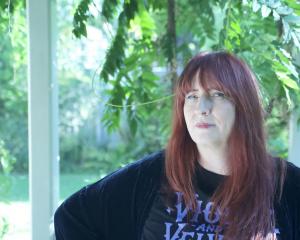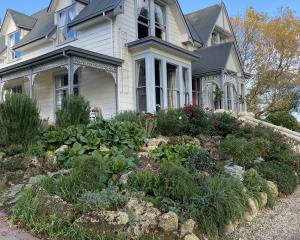Pulitzer Prize-winning novelist Jane Smiley is the author of dozens of novels and non-fiction works. Her latest novel, Golden Age, is the final instalment of a multigenerational trilogy set in 20th-century America. ODT book reviewer Jessie Neilson questions her before her Dunedin appearance next week.
Q Your output includes novels for adults and children, short story collections, essays and non-fiction. Like Pulitzer prize-winning A Thousand Acres, "The Last Hundred Years'' trilogy is set in the rural Midwest, an area you clearly know intimately. What prompted such an ambitious undertaking at this particular stage in your career?
A I didn't really think of it as ambitious, only as interesting and worth doing. I am interested in food, cooking, climate change, farming, politics, and the decline of the US. To tell that story, and thus explore cause and effect seemed like a good idea, not so much ambitious as fascinating. Climate change and food intersect in Iowa, the world of big corn, and a kind of American microcosm. So the title, "The Last Hundred Years'', came to me, and I saw that I should go year by year. Then I got really interested.
Q The trilogy follows members of the Langdon clan from 1920, and their descendants' lifestyle choices, crises, mishaps and exuberances until 100 years later. What a remarkable achievement to keep such a firm hand on multiple characters as we follow them through year by year. What did your pre-writing phase entail in order to map out the step-by-step maturing of so many characters so convincingly?
A The main thing, to begin with, was to think about how each of the characters would have been as infants. My experience of infants is that they are who they are pretty much from the day they are born. So I gave them circumstances and temperaments and inclinations, and sent them out into the world, first tiny (a room) and then large (wars, business, colleges, etc.) I wanted them to act in accordance with their predispositions and then see what they would do. I enjoyed it.
Q The trilogy focuses on the trials of farming life for this Iowa-based family. What is your personal experience of and investment in the American Midwest? How do you see the growth of urban, consumer- and technology-oriented careers as affecting the rural-based decline?
A I lived in Iowa from 1972 until 1996, first in Iowa City and then in Ames. For a few of those years, I lived outside of town. Since I was from Missouri, had relatives in Chicago, and eventually owned a house in northern Wisconsin (getting there entailed driving through Minnesota and Minneapolis), I got quite interested in the differences between all of these neighbouring states. Iowa is in some ways the compromise state: not urban (but there is Des Moines), not sophisticated (but there is the Iowa Writers Workshop), not in the forefront (except that lots of things, including the computer, were invented at Iowa State), not political (except that every four years, the starting gate for the presidential elections is the Iowa caucus. Also not a bad place to live (not as much snow and ice as Minnesota and Wisconsin, not as hot and humid as Missouri and Illinois), a strange mix of plain and beautiful.
Q The wider historical, socio-cultural and political dynamics form a vivid backdrop to these three novels. Thus the characters, and by association the reader, are situated within the changing climes. Examples include the assassinations of key figures, and your portrayals of the emergent movements of feminism and environmentalism, amongst numerous others. How did you go about garnering so much background knowledge?
A I read books and memoirs, visited some of the settings, and also did a lot of research online. There is plenty of material, it is just there to be discovered, like the Iowa State website about historical weather conditions in Iowa, and farm history websites, with recordings of farmers talking about their lives. I had to come up with theories about events, which I did, but nothing crackpotty, I hope.
Q In Golden Age, the last of the trilogy, there is an understandably increased focus on environmentalism and the urgent need for extreme measures to combat climate change and other human-caused catastrophes. Would you advocate that an individual approach this from a grassroots level?
A I would advocate that an individual approach this from every conceivable level, but I am coming to think that we cannot exactly save ourselves or what we've got. My view has gotten progressively darker.
Q What do you see as a writer's moral responsibility in drawing the reader's attention to critical matters such as climate change?
A There are two responsibilities: one is showing what is happening so that others can understand it and act, and the other is telling the history so that future readers can know what happened, or at least what one author thought happened. Every novel eventually becomes a historical novel, and is interesting partly for that reason.
Q Out of curiosity, and on behalf of other readers of this trilogy, do you have a soft spot for any of your characters in particular? I must say that Frank and Andy stand out in their three-dimensionality, wit, and ability to last the distance!
A I love Andy. I love Arthur, but since he is in the CIA, I have to torture him. I am quite fond of Rosanna, who reminds me a little of my grandmother, and I identify somewhat with Henry and Janet. I also like Richie, but I think he is a dope.
Q What have you been reading recently, and which writers do you hold as firm favourites?
A I love Anthony Trollope, Dickens, and a lot of other 19th-century novelists. I recently taught Northanger Abbey and was amazed all over again at Austen's wit and sophistication as a 22-year-old. I've read a lot of Mario Vargas Llosa, I am very fond of Nancy Mitford. I love Alice Munro. Other books that come to mind are Rebecca West's The Fountain Overflows and Station 11, by Emily St John Mandel.
Q Is it your first time here, and what are your plans while in New Zealand?
A No, I was here in 2000 for Horse Heaven. My plans are to do what I am told!
See her
Jane Smiley appears in conversation with University Book Shop general manager Phillippa Duffy on Tuesday, May 10, 6pm-7pm, at the Dunedin Public Art Gallery. The event is in association with the Dunedin Writers and Readers Festival and the Auckland Writers Festival. Tickets ($22/$18): UBS.
Read her
Novels
Barn Blind (1980)
At Paradise Gate (1981)
Duplicate Keys (1984)
The Greenlanders (1988)
A Thousand Acres (1991)
Moo (1995)
The All-True Travels and Adventures of Lidie Newton (1998)
Horse Heaven (2000)
Good Faith (2003)
Ten Days in the Hills (2007)
Private Life (2010)
Some Luck (2014)
Early Warning (2015)
Golden Age (2015)
Short story collections
The Age of Grief (1987)
Ordinary Love & Good Will (1989)
Non-fictionCatskill Crafts (1988)
Charles Dickens (2003)
A Year at the Races: Reflections on Horses, Humans, Love, Money, and Luck (2004)
Thirteen Ways of Looking at the Novel (2005)
The Man Who Invented the Computer (2010)
Young adult novels
The Georges and the Jewels (2009)
A Good Horse (2010)
True Blue (2011)
Pie in the Sky (2012)
Gee Whiz (2013)












